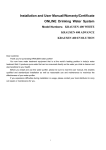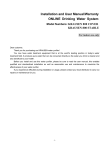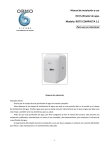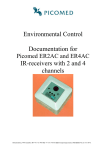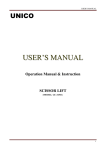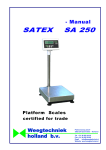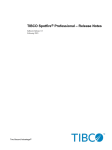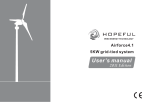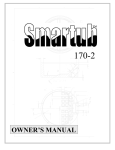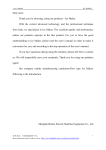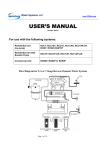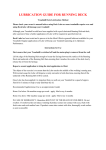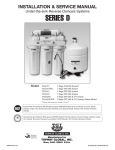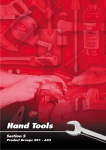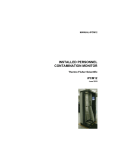Download KRAUSEN 75 LIGHT
Transcript
Installation and User Manual RO Water Purifier Model: K RAUSEN 75 LIG H T Respected customers: Thank you for purchasing our company‟s water purifier! The water purifier in your possession now is in the leading position among products in the world water treatment fields. The pure water it produces is not only drinkable but also good for your health. For the purpose that the machine is properly installed, utilized and maintained so that it can work in its best condition to ensure the constant supply of pure water, we suggest that you read this manual in details and follow our advice before installing. If you should encounter any difficulty in installing or using the machine, please contact the local dealer who will carry out repairs or maintenance for you without hesitation. 1 Contents Page Safety Warnings………………………………………….…………….3 Product Introduction..…………………………………….……………5 Installation Methods…..……………………………………………….8 ◆ Pre-Installation Preparations……………………………………………..8 ◆ Instructions for Proper Installation……………………………….………8 ◆ Installation Notes………………………………………………………….11 Testing………………………………………………………...…………12 Usage Methods…………………………………………………………12 Maintenance and Upkeep……………………………………..………13 ◆ Filter Replacement Time……………………………….…………………13 ◆ Filter Replacement Methods……………………………….…………….13 ◆ Notes ……………………………………………………………….………14 Failure Diagnosis & Solutions…..……………………….……………14 After-Sales Service……………………………………..………………15 Packing List……………………………………………………………..16 2 Safety Warnings (Be sure to read and remember these safety considerations) In order to avoid property damage and harm to you and others, make note of the following safety precautions. ★Ignoring the following safety precautions could result in a risky situation: Warnings If you ignore contents in this section, it may cause permanent damage to the water purifier or cause serious property damage. Notes If you ignore the contents in this section, it may lead to damage of some parts of the water purifier or may result in some property damage. Warnings Do not disassemble or modify this water purifier on your own! Unauthorized disassembly Do not put things on the top of the machine! or Obstructing the heat dissipation modification of the machine could may lead to machine damage or lead to machine malfunctions or fires. leakage accidents. Please check with the store where you purchased this product for product consultation in order to arrange for repairs. Do not put heavy objects on the water purifier! Do not use this water purifier under high water pressure conditions! If heavy objects are placed on the Operating under high pressure conditions may cause water purifier, it may result in the damage to the water purifier‟s rupture, resulting in leakage, the dust cover purifier pipes to internal machine working improperly, or components, which could lead to even serious property damage. leakage, the machine working Recommended inlet pressure is improperly, 0.1MPa to 0.35MPa. or or water even serious property damage. Do not let the machine come in contact with corrosive materials! Do not put the water purifier close to the fire! These materials could corrode Do not put the water purifier near the outer cover and affect the a fire source or place where the water parts or some toxic and temperature is too high, this may hazardous compounds could cause deformation or melting of penetrate the water purifier the machine, causing damage or pipes, leading to contaminated water production leakage, which could lead to serious bodily and and machine leakage, which could even cause property damage. bodily and property damage. 3 Do not use a power source exceeding the machine’s specified value, only use 220V AC power! When installing or repairing, the machine must be disconnected from the power source! The outlet used for the machine‟s Otherwise it may lead to electric current must be greater than the shock. machine‟s otherwise specified it may value; lead to overheating or fire. The machine must be connected in reliable grounding line socket and accord with the relevant national standards! Do not touch the power plug with wet hands! Otherwise it may lead to Otherwise it may lead to electric electric shock. shock, short circuiting, or fire. Notes Do not use the water purifier when the sewer is blocked up! The waste water discharge pipe and wastewater ratio device cannot be blocked! When the waste water If it is used while the sewer is blocked, it may cause the discharge pipes and waste waste water to back up or water ratio device are clogged, pollution to get inside the it may lead to high TDS water purifier. effluent, the RO membrane may get blocked or the water purifier may not work. Do not use in conditions under 5℃! Water purifier inlet water temperature should not exceed 38℃! If the temperature in the room water is below 5℃, please be sure temperature is over 38℃, it to take measures to prevent If the inlet will damage the reverse freezing, such as starting the osmosis membrane leading to membrane failure. heater or air conditioner to prevent leakage or cracked pipes caused from water freezing inside the machine. 4 Product Introduction 1. Blown-up profile of the water purifier Diagram 1 2. Electrical diagram Diagram 2 5 3. Water Flow Chart Diagram 3 4. Technical Parameters Voltage AC 220V 50HZ Power Rating 28.8W Suitable Water Pressure 0.05MPa~0.35MPa Operating Pressure 0.4MPa~0.6MPa Inlet Temperature 5-38℃ Maximum Inlet Water TDS Value ≤1000PPM Maximum Daily Water Production Volume 75 Gallons, approximately 284 Liters Flushing Method Auto flush Electric Shock Protection Type Type II Suitable Water Quality Municipal tap water meeting GB5749-2006 standards the Note: Due to product improvements, the above parameters may change but the product name plate shall stay the same. TDS refers to the influent total dissolved solids. 6 5. Water Purifier Main Parts Function Introduction Using the current most advanced international RO technology, standard configuration is as follows: ① First is a 10-inch 5-micron PP filter: The aperture of the PP filter is 5 microns, can effectively filter rust, sand, other larger particles and solid impurities in water. ② Second is a 10-inch 85C granular activated carbon filter: This machine can effectively adsorb chlorine, humus, disinfection by-products, odors, colors, and other materials. ③ Third is a 10-inch 1-micron PP filter: This machine can further remove small particles in the water, suspended solids, colloids, etc. ④ Fourth stage is RO membrane: Aperture is .0001 micron (0.1 nm), reduces bacterium by 4,000 fold, reduces viruses by over 200 fold, so you can effectively remove bacteria, viruses, heavy metals, pesticide residues, and other harmful substances from the water. ⑤ The fifth-stage is a post-activated carbon filter: Regulates water taste, keeps water fresh. Note: This machine also has an optional configuration: Pretreatment Filter: KDF two stage filter, KDF three stage filter, sintered activated carbon filter Post-filter: Alkaline filter, infrared mineralization activated carbon filter etc. 6. Water Purifier Accessory Functions Storage Tank: High Pressure Pump: Low Pressure Switch: Used to store water filtered by the water purifier. Boosts pressure to create a stable environment for the RO membrane. To prevent pump idling. When the inlet water pressure is less than 0.03 MPa or when the inlet water stops, the low pressure switch automatically shuts off the power source so the machine stops. High Pressure Switch: Prevents pump from fully turning. When the pressure tank is full or has reached the set pressure, power supply is automatically cut off to stop the machine. Inlet Water Solenoid Valve: Connects or cuts off incoming water. Operating pressure range is less than ≤0.6MPa. Non-return Valve: Controls the flow direction. Combination Flush Solenoid Valve: (1) Automatically flushes the reverse osmosis membrane. (2)Controls waste water flow. Transformer: Converting AC 220V to DC 24V (the machine‟s safe operating voltage). 7. Water purifier features: Large Flow Rate: It adopts the components of 75GPD RO membrane, the flow rate of which is 50% larger than the average, so the time of water producing is shortened and the amount of waste water is reduced by 25%. 7 Low Noise: This machine‟s imported parts have low noise, few vibrations, long service life, and operational quality and reliability; Quick Connectors: This kind of connectors has a brand-new design and a quick connecting technology, making it convenient to equip, use and maintain. Flushing RO Membrane: Flush with high pressure reverse osmosis membrane function, can prolong the reverse osmosis membrane life. Plastic Shelf : The new type of plastic shelf and layer board compared with an iron plate, this kind of steel shelf is smaller, lighter, rustless and easy to carry. Installation Our company recommends that the machine be installed by professionals for drills and other power tools will be used during the installation process. If you would like to do it by yourself, please refer to the following steps and diagrams: 1. Preparations ① Confirm the location where the water purifier will be installed (it depends on the actual circumstances) ② Make sure you„ve got all the tools required for installation Adjustable spanner 1 Drill 1 6.2mm drill bit 1 (waste water hole) Hole saw, φ14mm 1 (high-speed steel or marble hole saw) Phillips and flathead screwdrivers 1 of each Scissors 1 pair 14mm-16mm multi wrench 1 18mm-21mm multi wrench 1 Needle nose pliers 1 ③ Confirm that you have all the connectivity accessories required for installation ④Turn off the water and/or electricity before installing 2. Instructions ① Installation method of Inlet water metal hose and inlet water tee (if the metal hose diameter is 9mm, the inlet water tee must be purchased separately) Firstly, close the inlet water valve. Secondly, unscrew the metal hose from the inlet water valve. Thirdly, take out the inlet water tee from the accessory box, thread female screw of the inlet water tee into the outlet of inlet water valve. Lastly, thread one end of the newly unscrewed metal hose into the male screw of the inlet water tee. (See Diagram 4) 8 Diagram 4 ② 3-way inlet water joint and inlet water ball valve installation method Take out the inlet water ball valve from the water purifier accessories box, wrap appropriate Teflon tape on the male screw of the ball valve, (See Diagram 5) Smear a little silica gel on it if possible, then screw the ball valve into the corresponding hole of the 3-way inlet water joint, then screw the nut in place (See Diagram 6) Take out the 9mm tube, cut down a proper length , then connect one end to the inlet water ball valve and wrench the screw nut (See Diagram 4). Connect the other end of the tube to the tie-in of the 5-micron filter housing. The screw nut must be wrenched firmly in case the tube would crack, causing leakage. Diagram 5 Diagram 6 ③ Gooseneck faucet installation Drill a φ14mm hole in the counter where the faucet is to be installed, then take out the faucet from the water purifier accessory box. Start the faucet installation: Firstly, put the stainless steel neck on the faucet main body (See Diagram 7), then lower the main part of the faucet into the already drilled hole, and then put the spacer on the lower part of the faucet. Screw the fixed nut into the bottom end of the faucet to fix the faucet on the counter. Finally put the appropriate length of 6mm pipe into the water inlet connection, put the 6mm pipe stopper into one end, put on the 6mm nut and screw it to the bottom of the faucet (see Diagram 7). If you want to fix the faucet on the wall, please use the faucet hanging piece (be sure to tighten the joints to prevent leakage when installing). 9 Diagram 7 Diagram 8 ④ Waste water pipe installation Using a φ6mm drill to punch a small hole then take out a 6mm water pipe with proper length, one end of which is put into the hole. (See Diagram 8) Smear some silica gel on the joint of the 6mm pipe and the drain pipe to prevent leakage, then fix the waste water pipe on the drain pipe with a cable tie.(for large flow water purifiers you need to use waste water clip to insert it into the already drilled drain pipe hole) ⑤ RO Membrane Installation Firstly, take the water purifier and inlet water pipe out from the packaging, open the water purifier outer cover, unscrew the nut from the cap of RO membrane housing, and then, unscrew the membrane shell cover by using the housing wrench. Take the RO membrane from its packaging and put the end of the membrane with O-rings into the reverse osmosis membrane shell firmly. (See Diagram 9) Finally, tighten the membrane shell cover with the wrench, connect inlet water pipe to the tie-in on the RO membrane shell cover, screw the nut then put the membrane shell into the big clip. Warnings: ◆ Pay attention to the direction of the membrane when installing the RO membrane, ◆ Make sure that one end of the membrane has tow O-rings When installing the RO membrane, ◆ When installing, be sure to put the end with the O-ring into the end of the membrane shell with the pure water connection, when installing correctly you only need a little force to put the reverse osmosis membrane into the membrane shell, if you encounter too much resistance, please do not force the reverse osmosis membrane into the membrane shell, doing so may cause permanent damage to the membrane shell or membrane components (the membrane manufacturer does not assume responsibility for returned components due to damage during installation); ◆ Damage to the membrane shell and reverse osmosis membrane element caused as a result of the above reasons is not covered under the water purifier warranty. 10 Diagram 9 ⑥ Pre-filter installation First take the pre-filter out of the packaging, tear off the packaging of the filters in the order they should be inserted, from right to left, first is the 5 micron PP filter; second is the granular activated carbon filter, noting that the rubber pad must be installed on the top of the activated carbon filter; third is the 1 micron PP filter (See Diagram 10). ⑦ Storage tank installation First wrap Teflon tape around the water nozzle 4-5 times, Smear a little silica gel on it to prevent water seepage if necessary. Then screw the water tank ball valve into the water nozzle, Finally connect the water tube: stuff a pipe stopper into both ends of a 6mm tubing with a suitable length, one end of which should be connected to labeled storage tank connector on the water purifier and the other in the storage tank ball valve ,do remember to sleeve the screw nut. Finally put the storage tank on the base.( See Diagram 10) Diagram 10 3. Considerations ① When installing the water pipes, cannot install a drain stopper, in addition, for the water pipe bottom connector, the screw nut should have no wire teeth exposed. ② If the inlet water pipe is 9mm, should ensure that the inlet water tube and connector have 30-40cm of straight piping to avoid burst pipe accidents caused by bending in the pipe. ③ If the power cord wiring needs to be longer, then according to the wiring requirements use a Φ8mm pinched tube to wrap around the connection, then on the outside wrap around insulating electrical tape, do not place it on the floor, it should be suspended in the air or in another place away from the ground. ④ When installing, if you need to make a hole in the wall, you should first make sure that there are no electricity or water lines in the location you plan to drill. ⑤ Do connect the power supply wire to the reliable standardized ground wire .If not, the manufacturers will not take any responsibilities caused by safety accidents. ⑥ Water is forbid during installation otherwise electric leakage may happen because of the switching power supply. 11 Testing The source of water and power must be confirmed after the water route is connected right. Then follow these steps to troubleshoot the machine: 1. Open the tap water inlet valve as well as the water purifier inlet water ball valve, (See Diagram 11) plug in the power source and wait till the filters are full of water and pure water start to run from the gooseneck faucet. 2. Wait for the water purifier to operate stably (about 5-10 minutes), check each connection to make sure if it is secure and see if there is any leakage from the membrane shell, filters, etc. 3. Close the pure water gooseneck faucet and wait approximately for 30 seconds to check whether the waste water has stopped. 4. Open the gooseneck faucet to see if pure water is flowing, if not, check whether the tap water pressure is too low or whether the high pressure switch cannot be reset. 5. Shut off the inlet water ball valve when the machine is operating, After a while, observe the machine to see if it has stopped, if not ,please check the low pressure switch to see if it can be reset. 6. Only after everything is confirmed right, the water purifier can be used safely Diagram 11 Usage Methods 1、 The major components of this product are plastic, so please observe the machine constantly to ensure the security while using it. 2、In order to prevent microbial contamination of membrane components during storage and transportation the reverse osmosis membrane element package contains a small amount of protective solution while the post-activated carbon filter will emit activated carbon powder the first time it is used. So for the first hour the water purifier is operated, do not open the water storage tank. It is recommended that the water produced is thrown out, otherwise the pure water taste may be unusual. 3、 When you start operating the water purifier the pure water TDS value may be a little high, after running for some time the TDS value for pure water will gradually decrease until it is stable. 4、When you are using the water purifier, the inlet water ball valve should be opened and the pure water faucet needs to be turned on. When you are not using water turn off the water faucet, the high pressure switch will automatically cut off the water supply. 5、In these “usage ”, “usage” refers to when the power supply is connected and/or the inlet water ball valve is open so the water purifier is in a working condition. 12 Maintenance 1、Filter Replacement Time ①This machine‟s filter replacement cycle for the various filters is derived from statistical indicators on average tap water use estimates. If there are big discrepancies between the user‟s actual water quality and utilization rate and the average indicators, there will be more obvious differences between the filter‟s actual use time and the estimated cycle such as premature filter clogging, premature failure, etc. If this happens, filter replacement should be based on actual use, you should also promptly contact your local after-sales service department. ②This machine‟s estimated filter replacement cycle is based on average household water consumption and is suitable only for residential use, do not install this machine in places that require large volumes of water. If the water volume requirements are large, this company has appropriate machines for business purchase. ③ According to economic statistics on municipal tap water, a three person family on average uses 10L of water a day, according to the water volume and inlet water quality conditions, overall filter volume is approximately as follows (the following data is for reference only): Ranks Water Volume (tons) First: 10-inch inline 5-micron PP filter 7.5 Second: 10-inch inline granular activated carbon filter 7.5 Third: 10-inch inline 1-micron PP filter 10 Fourth: RO membrane depending on the actual water consumption Fifth: Post-activated carbon filter 6 Note: It is recommended that filter element replacement is carried out by after-sales staff. Water quality has a great influence on the life of the filter, the RO membrane’s lifespan is affected by many factors, the above table expresses lifespan under standard conditions, in actual usage, because the water quality may be different, the lifespan may exceed the above estimate, it may also be lower than the estimate, this data is for reference only. Under normal circumstances if the following situations are experienced, you should consider replacing the filter: ◆ Poor water quality, taste declines, TDS value of water rises; ◆ Water flow is significantly reduced, check to see if the filter or membrane is blocked (and determine that it was not caused by a temperature drop); ◆ If the filter‟s outer surface is covered in mud or the filter has significantly changed color; ◆ If serious filter clogging leads to no pure water from the water purifier. 2. Filter Replacement Method ① Replacing the 1st and 3rd stage PP filters Firstly, shut off the inlet water ball valve, unscrew the 1st and 3rd stage filter cartridges by using the filter cartridge wrench and then remove the old filters, take the new filters out of the packaging, finally place the filters in the filter cartridges and tighten the filter cover. (Note: place the 5 micron PP filter in the 1st stage filter cartridge, the 10-inch 85C granular activated carbon filter in the 2nd stage filter cartridge, the 1 micron PP filter in the 3rd stage filter cartridge) 13 ② For replacement of membrane elements please refer to “RO Membrane Installation”(Page 9) 3. Notes ① RO membrane water production volume This machine’s stated volume of 75GPD is tested with net pressure of 0.55MPa and inlet water temperature of 25℃, for the RO membrane component water volume is influenced by the inlet water pressure and water temperature, If not, the RO membrane element water production will be less than 75GPD. ② Disposal of old filters They cannot be cleaned and reused after being disposed and it is recommended that they be throwed into the garbage. Warnings ★Disconnect the water purifier water source (shut off the inlet water ball valve) and/or the power source immediately when any of the following situations occur, and carry out repairments. · If the water purifier pipes or related components are leaking. · If the water purifier’s related components stop working. · If any components leak electricity. · If there are any other anomalies or failures. ★Disconnect the water purifier water source (shut off the inlet water ball valve) and/or power source, when you go out or do not use the machine, ★ If any components of the water purifier are damaged, it is recommended that the water purifier be entrusted to the manufacturer or distributor, service center, or specialized technical personnel for replacement to prevent loss caused by improper operation, the manufacturer is not liable for losses caused by operation or use not in accordance with the instructions and reminders. Failure Diagnosis and Solutions Failures The machine fails to start Reasons Solutions Check the power source or the power source plug Low inlet water pressure or no water Check the inlet water pressure Low-pressure switch fails to connect the power source Replace it after connecting the inlet water and measure the resistance, High-pressure switch cannot be reset The power source is not connected 14 Replace it after letting off the pressure and measure the resistance, replace The high pressure pump is working properly, but no water is being produced The machine is turned off but waste water has not stopped After the machine is filled with water, the machine starts repeatedly The pure water hardly flows or even stops flowing Replace it after measuring the output voltage Switch power is damaged High-pressure pump has lost pressure Inlet water solenoid valve is faulty, no water can get in (no pure water) A pre-filter is blocked Measure the water pump pressure, replace and replace it Replace the solenoid valve Observe the pure water and waste waterand replace the pre-filter Non return valve is blocked (waste water, no pure water) Replace the non return valve The RO Membrane is plugged Clean or replace the RO membrane Inlet solenoid valve failed, cannot effectively cut off the water supply Observe the waste water, replace the inlet solenoid valve Non return valve has lost pressure (small waste water flow rate) Replace the non return valve Non return valve has lost pressure Replace the non return valve High-pressure switch fails Replace the high pressure switch System is exhibiting a loss of pressure Check whether there is water leakage in the pipelines Pre-filter is plugged Replace the pre-filter RO membrane is plugged Wash or replace the RO membrane Inlet solenoid valve fails Replace the inlet solenoid valve Non return valve is plugged Replace the non return valve High pressure pump pressure is not enough Measure the high pressure pump water pressure,and replace it After-Sales Service 1. The warranty is valid from the date of installation. 2. Warranty period: five-year machine warranty. The warranty does not include consumables (including filters and RO membranes). 3. Please keep the warranty in a safe place, for maintenance you must have your purchase invoice, only then is the warranty effective. 4. The warranty does not include no invoice, altered machine number, any rabirary dismentlement and refit , random operation and man-made damage. 5. If you encounter any abnormal phenomenon, please do not hesitate to turn off the water source, cut off the power, and contact your local vendor. Notes: The company reserves the right to change product design, configuration, and specifications without notice. The company has the final explanation rights for any unclear parts, mistakes or printing problems. 15 Packing List · Main machine (including RO membrane) 6mm water pipe · Storage tank · Installation and User Guide · Goose-neck faucet · Filter cartridge wrench · Membrane shell wrench · Accessory pack Consisting of:12mm 3 way inlet water valve 6mm Inlet water ball valve 6mm blue pipe stopper 6mm white screw nut Faucet hanging piece Storage tank ball valve Notes: Unit Conversion: 1 unit 1 roll 1pcs 1 copy 1pcs 1pcs 1pcs 1 package 1pcs 1pcs 5pcs 1pcs 1pcs 1pcs 0.1MPa =1.02Kg/cm2=14.5Psi 1Psi=0.07 Kg/cm2 1 Gallon =3.785 Liters 75GPD=75 Gallons/Day=284 Liters/Day=197 Milliliters/Minute 16
















